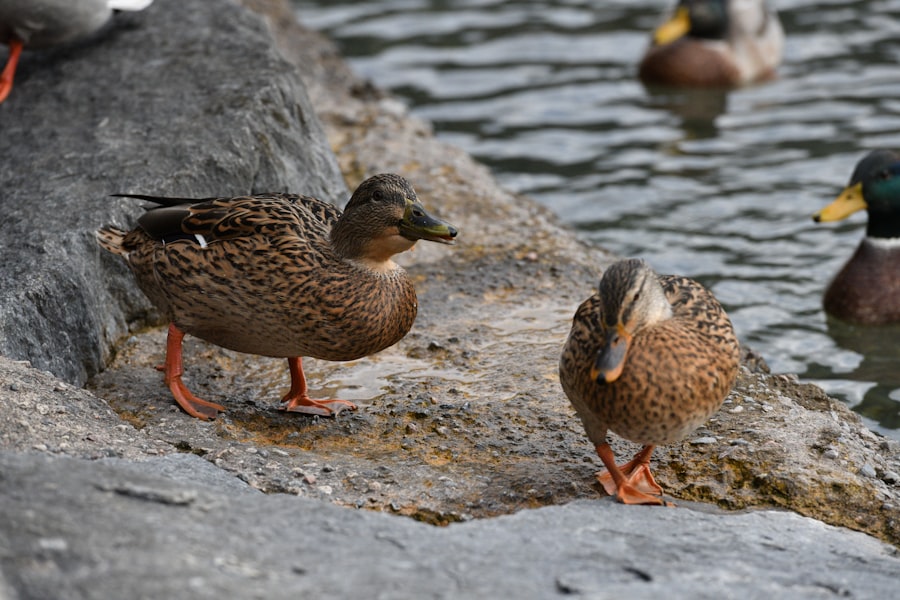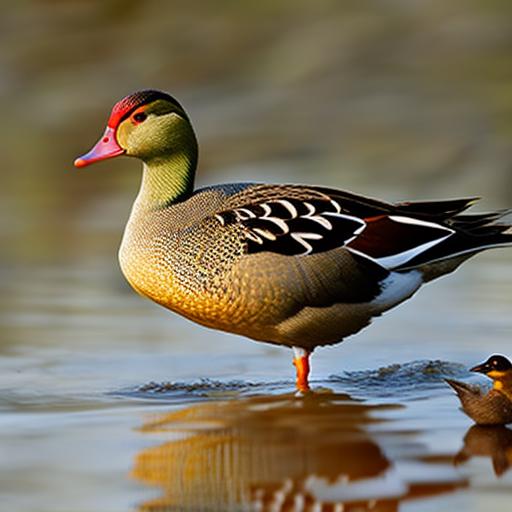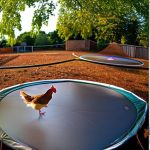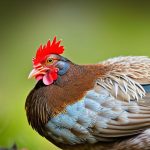Raising backyard poultry has become increasingly popular in recent years, with many people opting to keep chickens for their eggs and companionship. However, there is another type of poultry that is often overlooked but can be a great addition to any backyard flock – call ducks. Call ducks are small, ornamental ducks that are known for their distinctive quack and charming personalities. Understanding the differences between call ducks and chickens is important for creating a harmonious living environment and maximizing the benefits of keeping both species together.
Key Takeaways
- Call ducks and chickens have different physical and behavioral characteristics.
- Keeping call ducks and chickens together can provide benefits such as pest control and companionship.
- A safe and comfortable living space should be created for both species, with separate areas for nesting and roosting.
- Call ducks and chickens have different nutritional requirements and should be fed accordingly.
- Regular monitoring and observation are important for managing health concerns and addressing issues of aggression and bullying.
Understanding the Differences Between Call Ducks and Chickens
Physical differences between call ducks and chickens are quite obvious. Call ducks are much smaller in size compared to chickens, with an average weight of around 1-2 pounds. They have short bills, round bodies, and a unique upright posture. Chickens, on the other hand, come in various sizes and breeds, but they are generally larger and heavier than call ducks.
Behaviorally, call ducks and chickens also differ. Call ducks are known for their active and curious nature. They love to explore their surroundings and are excellent flyers. Chickens, on the other hand, are more grounded and tend to stay close to the ground. They scratch the soil for food and enjoy dust bathing.
When it comes to egg-laying, there are also differences between call ducks and chickens. Call ducks are not prolific layers like chickens. They typically lay around 50-100 eggs per year, while chickens can lay anywhere from 200-300 eggs per year, depending on the breed. However, call duck eggs are smaller in size compared to chicken eggs.
The Benefits of Keeping Call Ducks and Chickens Together
Keeping call ducks and chickens together can have several benefits. Firstly, they provide companionship for each other. Ducks and chickens have different social structures but can still form bonds with each other. They can keep each other company during the day and provide entertainment for their owners.
Secondly, call ducks and chickens can help control pests in the backyard. Ducks are excellent foragers and love to eat insects, slugs, and snails. Chickens also enjoy scratching the ground for bugs and can help keep the pest population under control. This natural pest control can be beneficial for the garden and overall backyard ecosystem.
Lastly, keeping call ducks and chickens together can increase egg production. While call ducks may not lay as many eggs as chickens, their presence can stimulate egg-laying in chickens. The social dynamics between the two species can create a positive environment for egg production.
Creating a Safe and Comfortable Living Space for Both Species
When keeping call ducks and chickens together, it is important to provide a safe and comfortable living space for both species. They should have separate areas for nesting, feeding, and roosting to prevent any conflicts or competition.
For housing requirements, chickens typically require a coop with nesting boxes and perches. The coop should be predator-proof and provide adequate ventilation. Call ducks, on the other hand, require a secure enclosure with access to water for swimming. They also need shelter from extreme weather conditions.
Nesting boxes should be provided for both species to lay their eggs. Chickens prefer dark and secluded nesting boxes, while call ducks prefer shallow nesting boxes with soft bedding material.
Water and food sources should also be provided separately for call ducks and chickens. Ducks require access to water for swimming and drinking, while chickens need access to clean water for drinking. Feeders should be placed at different heights to accommodate the different sizes of call ducks and chickens.
Feeding and Nutrition Requirements for Call Ducks and Chickens
Call ducks and chickens have different dietary needs, so it is important to provide them with appropriate nutrition. Ducks are omnivores and require a balanced diet of grains, vegetables, insects, and protein sources such as fish or mealworms. They also need access to water for drinking and swimming.
Chickens, on the other hand, are primarily herbivores and require a diet high in grains, seeds, and leafy greens. They also need access to grit for proper digestion. A balanced layer feed should be provided to ensure they receive all the necessary nutrients for egg production.
Supplemental feeding can be beneficial for both call ducks and chickens. Offering treats such as fruits, vegetables, or mealworms can provide enrichment and help strengthen the bond between the two species.
Managing Health Concerns When Raising Call Ducks and Chickens Together

When raising call ducks and chickens together, it is important to be aware of common health issues that can affect both species. Some common health issues in ducks include respiratory infections, parasites, and bumblefoot. Chickens are prone to respiratory infections, mites, lice, and egg-laying issues.
Prevention is key when it comes to managing health concerns. Providing a clean living environment, regular cleaning of water sources, and proper nutrition can help prevent many health issues. Regular veterinary check-ups are also important to catch any potential health problems early on.
Social Dynamics Between Call Ducks and Chickens
Call ducks and chickens have different social dynamics but can still interact with each other in a positive way. Ducks are social animals and enjoy the company of other ducks or chickens. They can form bonds with each other and establish a pecking order within their group.
Chickens are also social animals and enjoy the company of other chickens or ducks. They may be curious about the ducks’ behavior and may try to imitate them in some ways.
Socialization between call ducks and chickens can provide enrichment for both species. They can learn from each other’s behaviors and develop a sense of community within their flock.
Addressing Issues of Aggression and Bullying Between the Two Species
In some cases, aggression and bullying can occur between call ducks and chickens. This can be due to competition for resources or differences in social structures.
To prevent aggression, it is important to provide enough space and resources for both species. Separate feeding areas and nesting boxes can help reduce competition. If aggression does occur, intervention strategies such as distraction or separation may be necessary.
If aggression persists and poses a threat to the well-being of either species, it may be necessary to separate individuals into different enclosures.
The Importance of Regular Monitoring and Observation
Regular monitoring and observation are crucial when raising call ducks and chickens together. By observing their behavior, owners can identify any potential issues early on and make adjustments to their living space or diet as needed.
Monitoring behavior can also help identify any signs of illness or stress in either species. Changes in eating habits, behavior, or appearance should be noted and addressed promptly.
Training and Handling Techniques for Call Ducks and Chickens
When handling call ducks and chickens, it is important to do so gently and with care. Both species can be easily startled or stressed, so it is important to approach them calmly and slowly.
Training call ducks and chickens to come when called can be beneficial for their safety and management. Using positive reinforcement techniques such as treats or praise can help reinforce desired behaviors.
Teaching basic commands such as “stay” or “come” can also help with managing their behavior in certain situations.
Enjoying the Unique Personalities and Characteristics of Both Species
One of the joys of raising call ducks and chickens together is getting to know their unique personalities and characteristics. Call ducks are known for their playful nature, while chickens have their own quirks and behaviors.
Call ducks are excellent swimmers and enjoy splashing around in water. They are also known for their distinctive quack, which is much quieter than that of other duck breeds.
Chickens have their own unique personalities and can be quite entertaining to watch. They have different vocalizations and behaviors depending on their breed.
Raising call ducks and chickens together can be a rewarding experience. Understanding the differences between the two species is important for creating a harmonious living environment and maximizing the benefits of keeping both species together. By providing a safe and comfortable living space, appropriate nutrition, and regular monitoring, owners can enjoy the unique personalities and characteristics of both call ducks and chickens. So why not give it a try and experience the joy of raising these two wonderful species together in your own backyard?
If you’re considering keeping call ducks and chickens together, it’s important to understand the compatibility between these two species. While they can coexist peacefully, there are certain factors to consider. In a recent article on Poultry Wizard, they discuss the benefits and challenges of keeping call ducks and chickens together in the same coop. The article provides valuable insights into the social dynamics, space requirements, and potential issues that may arise when housing these two species together. To learn more about this topic, check out the article here.
FAQs
What are call ducks and chickens?
Call ducks are a small domesticated breed of duck that are commonly kept as pets or for exhibition purposes. Chickens, on the other hand, are domesticated birds that are commonly raised for their meat and eggs.
Can call ducks and chickens be kept together?
Yes, call ducks and chickens can be kept together as long as they are introduced properly and have enough space to coexist peacefully. However, it is important to note that ducks and chickens have different dietary needs and housing requirements.
What are the benefits of keeping call ducks and chickens together?
Keeping call ducks and chickens together can provide a diverse and interesting backyard flock. They can also help control pests and weeds in the garden and provide a source of fresh eggs and meat.
What are the challenges of keeping call ducks and chickens together?
The main challenge of keeping call ducks and chickens together is ensuring that they have enough space and resources to coexist peacefully. Ducks and chickens have different dietary needs and housing requirements, so it is important to provide separate feeding and watering stations and appropriate shelter.
What should I consider before keeping call ducks and chickens together?
Before keeping call ducks and chickens together, you should consider the space and resources available, the compatibility of the two species, and the potential health risks. It is also important to research the specific dietary and housing requirements of each species to ensure their needs are being met.
Meet Walter, the feathered-friend fanatic of Florida! Nestled in the sunshine state, Walter struts through life with his feathered companions, clucking his way to happiness. With a coop that’s fancier than a five-star hotel, he’s the Don Juan of the chicken world. When he’s not teaching his hens to do the cha-cha, you’ll find him in a heated debate with his prized rooster, Sir Clucks-a-Lot. Walter’s poultry passion is no yolk; he’s the sunny-side-up guy you never knew you needed in your flock of friends!







